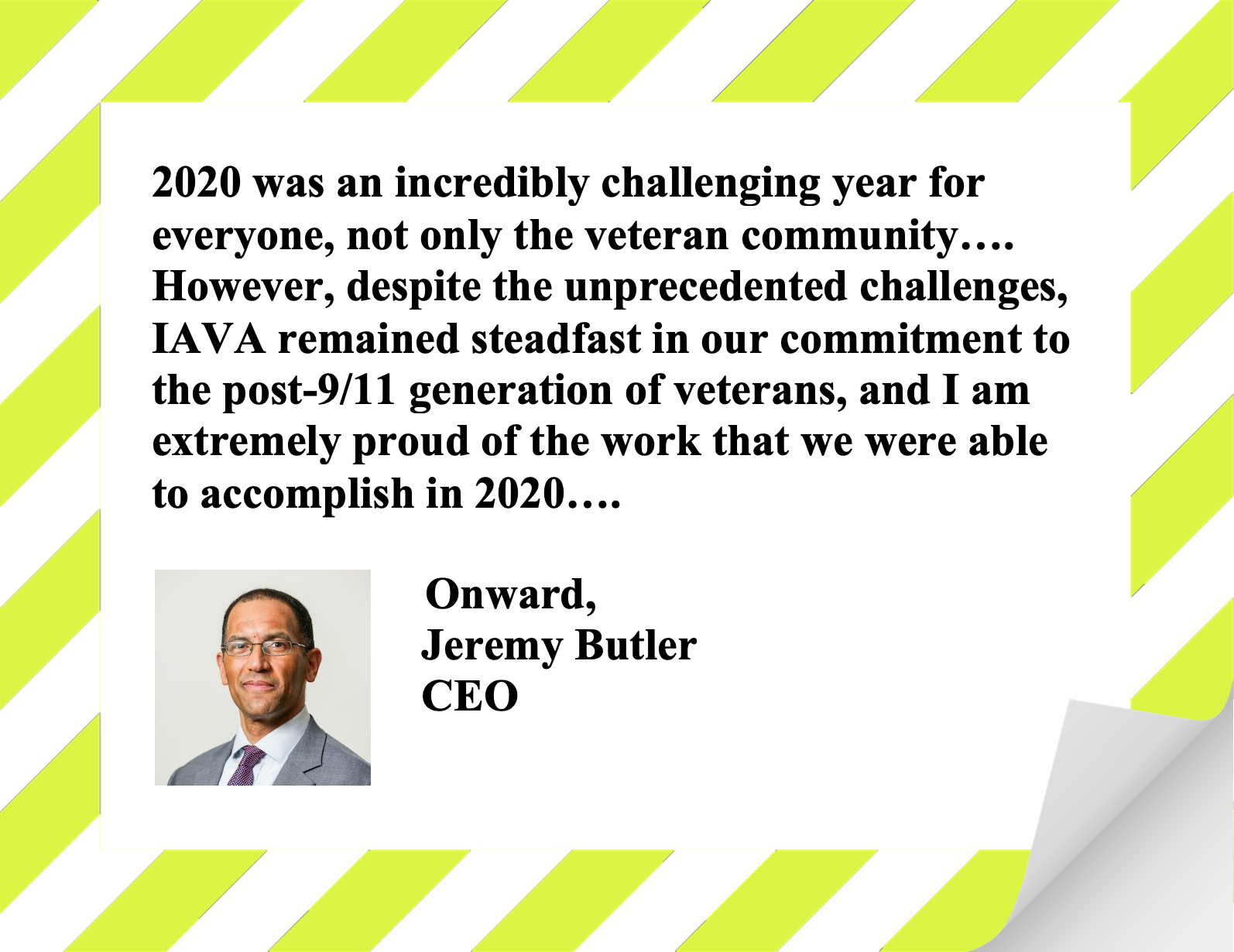IAVA's Policy Agenda for the 117th Congress
Combat Suicide among Troops and Veterans
Campaign to Combat Suicide among Troops and Veterans
For nearly a decade, IAVA and the veteran community have called for immediate action by our nation’s leaders to combat the crisis of 20 servicemembers and veterans dying every day from suicide. In the last two years, we made significant strides towards addressing this epidemic.
2020 was a groundbreaking year in mental health and suicide prevention. The passage of the IAVA-backed Commander John Scott Hannon Veterans Mental Health Care Improvement Act will result in critical reforms in how America combats the suicide crisis. Key provisions of this legislation will include the creation of a community grant program to help identify isolated veterans and provide mental health services, which is modeled after the extremely successful Supportive Services for Veteran Families (SSVF) program. These targeted programs are designed to identify the 14 veterans per day who die by suicide but are not currently participating in VA services and connect them to lifesaving resources. Additionally, this legislation will expand VA’s tele-health services at a time when veterans may be feeling more disconnected than ever before. These are critical improvements to VA care. But the work is not done.
According to the most recent VA data, the youngest cohort of veterans, post-9/11 veterans aged 18 to 34, have the highest rate of suicide. And while not always an indicator of suicide, mental health injuries continue to disproportionately impact the post-9/11 generation. In our latest member survey, a stunning 65% of IAVA members reported service-connected PTSD and over half reported anxiety (58%) or depression (56%). Meanwhile, the nation and VA struggle to keep up with the demand for mental health care and mental health care providers such as psychiatrists and psychologists, both of which are in the top 5 for VA staffing shortages.
Over the past few years, there has been much progress made in the realm of suicide prevention and mental health. The VA, DoD, and DHS’ plan for transitioning service members targets those in the post-9/11 generation at increased risk of suicide to engage with them before the moment of crisis. VA has leveraged tele-mental health care to expand its reach and predictive analytics to target the top 0.1% of veterans at risk for suicide. These reforms are critical to addressing the suicide crisis and IAVA remains dedicated to combating suicide.
Normalize Mental Health Discussions
Normalize Mental Health Discussions
We often talk about destigmatizing the discussion around mental health as a way to reduce barriers to care. But as we look to the future, we believe it is imperative to not only destigmatize those who seek mental health care but to also normalize the conversation on mental health in general. As a nation, we should strive to discuss mental health injuries and the invisible wounds of war in the same way we discuss physical injuries. Ending the stigma will help to improve the lives of not only veterans, but all Americans.
IAVA members report incredibly high levels of mental health injuries, from 65% reporting PTSD and over half reporting anxiety or depression. And yet, when asked why service members and veterans are not getting the mental health care they need, stigma is one of the top reasons IAVA members cite. However there is some good news. Of those with a mental health injury, more than 3 in 4 are seeking care for their injury according to IAVA members.
Ensuring that those with mental health injuries have access to care is as important as ensuring that those that access that care are not stigmatized or face harmful repercussions for seeking care. Engaging all members of society on this topic, from those in leadership commands within the Administration and Congress, to national media, to all American citizens, will be required to normalize the discussion around mental health care.
IAVA's Recommendations
- Continue to improve public understanding around mental health injuries
- Highlight stories of triumph and success in the veteran community of those with mental health injuries
- Continue to destigmatize mental health injuries and mental health treatment
- Continue to change the culture within the Department of Defense and ensure those in command positions encourage those with mental health injuries to seek treatment
- Build coalitions across industries to support veterans as they transition into civilian life
- Partner with other organizations such as the American Foundation for Suicide Prevention, American Society of Suicidology, and National Action Alliance for Suicide Prevention on public awareness and education campaigns around mental health injuries
IAVA's Policy Priorities
Select a topic from the list below to learn about IAVA’s policy recommendations for the 117th Congress.

